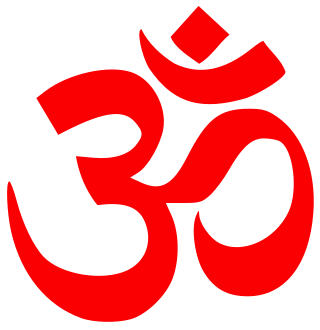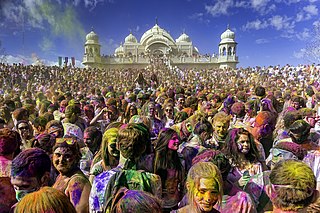Hinduism is an Indian religion or dharma, a religious and universal order by which its followers abide. The word Hindu is an exonym, and while Hinduism has been called the oldest religion in the world, it has also been described as sanātana dharma, a modern usage, based on the belief that its origins lie beyond human history, as revealed in the Hindu texts. Another endonym for Hinduism is Vaidika dharma.

Hinduism has been spread in Russia primarily due to the work of scholars from the religious organization International Society for Krishna Consciousness (ISKCON) and by itinerant Swamis from India and small communities of Indian immigrants. While ISKCON appear to have a relatively strong following in Russia, the other organizations in the list have a marginal presence in this country. There is an active Tantra Sangha operating in Russia. According to the 2012 official census, there are 140,010 Hindus in Russia, which accounts for 0.1% population of Russia.

Hinduism is the fourth-largest religion in Malaysia. About 1.78 million Malaysian residents are Hindus, according to 2010 Census of Malaysia. This is up from 1,380,400 in 2000.

Hinduism is a minority religion constituting about 0.15% of the population of Austria. Hinduism is not one of the 16 recognised religions in Austria. The Austrian law allows religious groups not recognized as societies to seek official status as confessional communities with the Office for Religious Affairs. Hinduism is one of the eight confessional communities in Austria. However, the Sahaja Yoga and the International Society for Krishna Consciousness are categorised as associations, not as confessional communities.

Hinduism is the fourth-largest religion in the United States, comprising 1% of the population, the same as Buddhism and Islam. The majority of American Hindus are immigrants, mainly from India, Nepal, Sri Lanka, and Bangladesh, with a minority from Bhutan, Pakistan, Afghanistan and other countries.
Subud literature rejects the suggestion that Subud is a religion, but rather describes it as "spiritual dancing". The difference between religion and spirituality is much debated. Subud is treated as a religious organisation in some countries, such as the UK, where it is registered as religious charity, but in other places, such as Indonesia, it is viewed by the government as an education organisation, since the government officially endorse only six religions, and religious conflicts between majority and minority are rife. It appears that Subud is forced because of conditions in some countries to register as a religion as there are no alternative categories offered for registration.

Hinduism in Mongolia is a minority religion; it has few followers and only began to appear in Mongolia in the late twentieth century. According to the 2010 and 2011 Mongolian census, the majority of people that identify as religious follow Buddhism (86%), Shamanism (4.7), Islam (4.9%) or Christianity (3.5). Only 0.5% of the population follow other religions.

The dominant religion in Slovenia is Christianity, primarily the Catholic Church, which is the largest Christian denomination in the country. Other Christian groups having significant followings in the country include Eastern Orthodoxy and Protestantism (Lutheranism). Islam, Judaism and Hinduism are small minorities in Slovenia. About 18% of the population are either agnostic or atheist.
According to various polls, the majority of Kazakhstan's citizens, primarily ethnic Kazakhs, identify as Sunni Muslims. In 2020, Shia Muslims made up 0.55% of the population.
The Bhutanese Constitution of 2008 and previous law provide for freedom of religion in Bhutan; however, the government has limited non-Buddhist missionary activity, barring non-Buddhist missionaries from entering the country, limiting construction of non-Buddhist religious buildings, and restricting the celebration of some non-Buddhist religious festivals.
Nepal is a secular state under the Constitution of Nepal 2015, where "secular" means religious, cultural freedoms, including protection of religion and culture handed down from time immemorial.

Christianity is the largest religion in Nauru, with Nauru Congregational Church being the largest denomination, encompassing 35.71% of the population as of the 2011 census.

Religion in Slovakia is predominantly Christianity, adhered to by about 68.8% of the population in 2021.

The reception of Hinduism in the Western world began in the 19th century, at first at an academic level of religious studies and antiquarian interest in Sanskrit.
Hindu denominations, sampradayas, traditions, movements, and sects are traditions and sub-traditions within Hinduism centered on one or more gods or goddesses, such as Vishnu, Shiva, Shakti and so on. The term sampradaya is used for branches with a particular founder-guru with a particular philosophy.
The status of religious freedom in Africa varies from country to country. States can differ based on whether or not they guarantee equal treatment under law for followers of different religions, whether they establish a state religion, the extent to which religious organizations operating within the country are policed, and the extent to which religious law is used as a basis for the country's legal code.
The status of religious freedom in Asia varies from country to country. States can differ based on whether or not they guarantee equal treatment under law for followers of different religions, whether they establish a state religion, the extent to which religious organizations operating within the country are policed, and the extent to which religious law is used as a basis for the country's legal code.
The status of religious freedom in North America varies from country to country. States can differ based on whether or not they guarantee equal treatment under law for followers of different religions, whether they establish a state religion, the extent to which religious organizations operating within the country are policed, and the extent to which religious law is used as a basis for the country's legal code.
Freedom of religion in Slovakia refers to the extent to which people in Slovakia are freely able to practice their religious beliefs, taking into account both government policies and societal attitudes toward religious groups.
The Science of Identity Foundation (SIF) is a Bhakti Yoga spiritual and religious organization, grounded in Hindu Vaishnava principles, founded by Chris Butler in 1977, based in Hawaii, United States. Its theology is broadly based on Bhagavad Gita and Bhagavata Purana.







